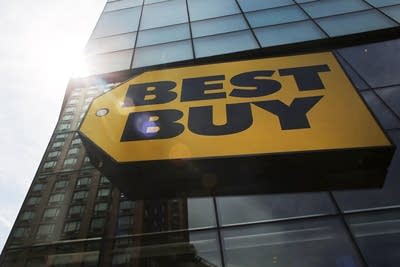Is Best Buy's soaring stock value justified?

Go Deeper.
Create an account or log in to save stories.
Like this?
Thanks for liking this story! We have added it to a list of your favorite stories.
A year ago, Wall Street was losing faith fast in Best Buy.
The consumer electronics retailer's stock had plummeted, losing about three-quarters of its value over two years. But investors have become bullish on Best Buy once again and they'll be looking for some confirmation of their renewed faith in the retailer when the company reports quarterly earnings on Tuesday.
At $43.61 a share on Friday, Best Buy's stock has almost quadrupled in price from late December, when some thought the company was doomed, fated to die at the hands of Walmart, Amazon.com and other powerful low-price competitors.
Now Best Buy is looking like a firm that has stopped the death spiral, thanks to what analysts praise as smart moves by management.
Turn Up Your Support
MPR News helps you turn down the noise and build shared understanding. Turn up your support for this public resource and keep trusted journalism accessible to all.
"Best Buy is in a much better position than they were a year ago," Morningstar retail analyst R.J. Hottovy said. "A lot of credit goes to management for executing on really what was the only viable turn-around plan — to partner with other vendors, to build out stores within stores, to really go after this price-matching concept."
CEO Hubert Joly's "Renew Blue" campaign has revamped stores to provide dedicated sales space for key suppliers such as Samsung and Microsoft, as well as a greater focus on big-ticket items like appliances, mobile phones and computers.
Joly is also cutting annual operating costs by more than $700 million. The effort has included hundreds of job cuts at the company's headquarters.
Best Buy has been upgrading its web site, too, striving to fill orders faster. And the retailer has promised to match key rival's prices on identical products.
Company spokesman Matt Furman said the price-match policy pretty much makes it pointless for consumers to check products in a store to see if they like them before buying them for a better price online — which the industry calls "showrooming."
"Why would you do that if the price in our store is the exact same price you can get online?" Furman asked. "You wouldn't, because you can pick it up in the store right then and there. If you needed to return it, you can return it easily. And if you needed some advice installation or even delivery, we're able to do that for you, too.
"A year ago, there was a lot of noise around showrooming," he said. "But we believe if we haven't killed it, we certainly wounded it severely."
Best Buy officials won't say how often the company has been asked to match a price or what that commitment has cost it. But Furman said such requests are not significant because Best Buy's prices are competitive to begin with.
Sixteen analysts following Best Buy now rate the stock a buy, even though the company's finances remain much weaker than they were several years ago. A year ago, just two analysts recommended the stock.
Retail consultant Howard Davidowitz said Wall Street's current love for Best Buy reminds him of the its past scorn for the retailer.
"There's only one thing guaranteed on Wall Street: They overreact," he said.
Last winter, doubts about the company's future were fueled by a leadership scandal and founder Dick Schulze's bid to buy the company and take it private. Schulze failed in his quest but made peace with the company, which has gone on to post profits in its past two quarters.
But is Best Buy fixed?
Davidowitz said it's far too early to tell.
"They've done a lot of good things," he said. "They've driven costs down. Closing bad stores. Their low-price guarantee policy has helped tremendously. But I think they're still an at-risk company. When you look at their numbers, there's no growth in sales."
Analysts measure growth by looking at stores open for at least 14 months to obtain the so-called same-stores sales measure. Best Buys' same-stores sales have fallen for 12 consecutive quarters.
Edward Jones retail analyst Brain Yarbrough said the slide in same-store sales indicates Best Buy is losing sales to competitors, raising doubts about how well the company can perform long term.
Yarbrough said Wall Street investors will be looking for Best Buy to put up some reassuring numbers on Tuesday.
"Expectations are for some pretty compelling results," he said. "They're going to have to show they can grow same-store sales and grow profits at the same time or they'll be some serious questions."
A 2 to 3 percent growth in same-store sales would be reassuring, Yarbrough said. Anything less might spook investors, especially as Best Buy heads into the heart of the critical holiday shopping season.



